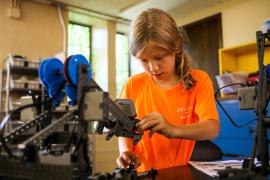Summer camp, unlike any other space or community, is a place where we can actively and comprehensively create culture. Think about some of the traditions at your camp. Simple things like the songs and cheers at a meal or some of the rituals around traditional programs. These are examples of how your camp community intentionally (or sometimes unintentionally) creates a specific culture that you, your campers, and the next generation of both staff and campers will maintain. The same thing happens in our wider society; it is just harder to predict, change, or understand. Role models are part of the driving force behind culture. The people and the institutions (like church or government) that we follow help us to maintain and sometimes change our culture.
What does all of this mean? You are pretty powerful. As a frontline staff member at a summer camp, you are in a unique position to set, maintain, and even radically change the culture that you and your campers experience in a way that most people don’t have a chance to experience. Have you ever noticed that small things that you or your friends do can become “the way we do it” at your camp, seemingly overnight? You sing a verse of one song with a slight variation or a different hand motion and by tomorrow everyone is doing it. It doesn’t just happen with small things either. How we treat each other, whether we accept everyone unconditionally, and our sense of security and safety all come from the culture we create. That’s what I mean by powerful. And of course, we can take a page right out of Spider-Man’s playbook here: With great power comes great responsibility. That responsibility is to the principles, values, and goals of your summer camp and organization. Many camps have very similar values, like being community driven, inclusive, or respectful. Others have different values or goals that include religious education or experience, competition, or being in a single-gender community. There is room for everyone’s positive goals, principles, and values in summer camp.
Campers will come to camp this summer with many ideas and experiences that may run counter to the values of your camp. In some of their home and societal experiences, it would be easy to see how they might think being mean or exclusive is the right thing to do. It isn’t hard to imagine kids taking to Twitter to bully someone or disparage a whole group. As frontline staff, many people have called you superheroes, including the vast majority of campers. So, what would Spider-Man do?
Take on Villains Personally
If there was one phrase that could capture what you signed up to do this summer, it would be role model. Just like you have done with the role models in your life, the campers will watch and listen to you all the time. What they take away is sometimes the small things, like the music you listen to, and sometimes the big things, like how you treat other people. For you to do battle with the destructive values and messages that campers may bring with them to camp, you have to take it on personally. You can’t defer this responsibility to someone else, it’s yours.
Use Your Spidey-Sense
Spider-Man can’t time travel; he sees things happen in real-time. However, it is his reaction time that is so impressive. Use your Spidey-senses this summer to react immediately and in real-time when campers are being disrespectful, exclusive, or mean. If you pay attention, you can see it coming. You can hear it in their words andsee it in their body language, and because you are going to work so hard to create meaningful relationships with each of your campers, they will also confide in you when someone hurts them or anyone else. The camp counselor’s version of Spidey-sense is awareness and relationships.
The foundation of being a great role model at camp is having empathy for your campers, being inclusive of everyone at camp, and creating genuine community.
Empathy
What does empathy really mean? It’s identifying with the thoughts, feelings, and attitudes of someone else. To really deliver on the principles and goals of your camp, you first have to get good at identifying with where the campers are coming from. This isn’t as hard as it might sound. When was the last time you felt awkward, uncool, or like an outsider? Chances are it was recently. But you’re an adult! You don’t have to worry about fitting in and being cool, right? Obviously, we all worry about this kind of stuff. While we may have different goals or intentions when it comes to being cool, different experiences with this, and varying abilities to help (or hurt) our chances of fulfilling our goals, we are all on the “want to be cool” spectrum somewhere. If we can let ourselves go a little and try to put ourselves in our campers’ shoes, it’ll be a lot easier to show genuine empathy. There are some tried-and-true ways to develop your empathy:
- Get to know them. I know you do this anyway, but the trick here is to actively seek out and engage with them. It’s more than small talk that you have to be really good at as a camp counselor; it is being able to follow their train of thought, ask good follow-up questions, and really pay attention to how they are connected to other campers.
- Ask them questions. You can’t ask campers enough questions. The best questions are open-ended. Spend time with them, ask them what they think, ask them about stuff outside of camp, ask them to use their imagination, ask, ask, ask . . .
- Respect their ideas, feelings, and choices. This is tricky, because at first glance it seems obvious, but, in fact, it is really hard. Like it or not, most of us exist in an environment that is set up for adult convenience, not necessarily what is best for campers. Everything, from the supervision rules to sitting at meals and the schedule of the day, can typically be traced back to what would be easiest on the adults to facilitate the experience for kids. So, it is up to you to show them that you actually do respect them. The first step is to listen and listen carefully. They may say something that you think is wrong. You can correct a camper without being disrespectful. Have you ever had a teacher that corrected you? How did it feel? For some of you just being wrong was what hurt, but for most of us it is more about how someone corrected us that made us feel disrespected. Campers are in control of what they do and how they feel. If you start with that idea, then you will be a lot more respectful when you need them to make a different choice or at least be less vocal in opposition.
- Pay attention to what they do. Listening to their words is only one way of getting to know your campers and understanding where they are coming from. Observe their behavior at activities, in groups, when they are one-on-one, when they are alone, at the beginning of the day, at the end of the day — all the time. Every action makes sense to the actor, so pay attention to what they do and you’ll have a better understanding of who they are.
Be Inclusive
Peter Parker is a struggling, awkward teenager. I bet he feels left out a lot, maybe picked on or teased, and definitely not that cool — and he is Spider-Man! There is no one out there who doesn’t sometimes feel left out, bullied, or excluded. Camp is different. Camp is one of the only places in the world where you are loved and respected for being the authentic and genuine you, where unique is cool, and where weird is not wrong. But that doesn’t happen automatically; we have to create that and be intentional about supporting and maintaining it. Wearing that tutu and wig is way more than just being silly for the afternoon; it is about role-modeling what being confident and unique is all about. When your campers see that you are not shunned or made fun of, but are embraced by the other staff members and campers, you are showing what real inclusivity looks like. Really big ideas like inclusivity and diversity can be accomplished, in real-time, when we have the power to control the culture in which we live.
- Ask for ideas and create consensus. One of the easiest ways to be intentional about inclusivity is to ask for, accept, and build on campers’ ideas. From group storytelling to options at activity areas and working through group conflicts, the simple act of asking, listening, and affirming will help everyone implicitly understand the inclusive culture at your camp.
- Make “other choices” acceptable. Related to asking for ideas is creating options that are realistic for campers to choose. Once campers are used to an environment where they have power and control that they can exercise through choice, they will be more apt to come up with their own alternatives. That might look like using art material in a very different way than you planned, or creating an entirely new game using the sports equipment you got out. It could even look like a decision to sit out of an activity. As adults, we sometimes forget that camp is for kids and that they should be allowed to make new and different choices — even if it isn’t convenient for us or doesn’t match our well-thought-out plan. Work hard this summer to create a space where kids’ “other” choices are okay. It is one of the trademarks of a really inclusive community.
- Observe and praise differences. When consciously creating an inclusive community, one of the most basic ideas is to not only accept differences, but celebrate them. One thing you can do as a frontline staff person is to notice and praise those differences. When campers break from the pack and do their own thing, whether in an activity, idea, style, or anything else, if you notice, support and praise it. You will widen the boundaries on what is acceptable.
- Limit competition. I think competition is good. I also think campers need to learn to lose. I don’t believe everyone should get a participation award just for showing up. And I think that when there is too much competition, especially at the beginning of an experience like a session at camp, it can drive uniformity and exclusivity. When we are thoughtful and looking to ensure campers feel secure in their groups and relationships before we introduce the segregating nature of competition, we implicitly highlight inclusivity.
Community
Community is the center point of summer camp. Being a part of something bigger that has meaning and is really fun is one of the hallmarks of camp. It is why so many people identify so strongly with camp, whether they are young campers, current staff members, or alumni. If we are going to create a culture based on specific goals and values, it is through the community that those values will live and breathe. Creating a genuine community at camp takes intentionality and thoughtfulness. What are your values, principles, and goals? How do you operationalize them throughout your day at camp? These shouldn’t just be stuck in the middle of some stuffy mission statement; they should be living, breathing ideas that you can see in action through most interactions at camp.
Is responsibility a core value at your camp? We can easily talk about that idea during clean-up time at activities or when assigning dining hall jobs to campers in our group. But how does responsibility come up when you are talking to a camper about a poor choice he or she made? What about at arts and crafts when campers are trying to decide which project to make? Experiencing a program’s core values is a lesson that can be learned around every corner. It just takes you being thoughtful and prepared.
You Be the Superhero
Here’s the problem though: It’s on you. I know this seems like a big deal that your camp’s directors should worry about — and they probably do. Whether they have explained this to you or not, they don’t really run the program. You do. So they can offer great ideas, but you have to make all those ideas happen on the ground and with the campers.
To be really thoughtful about your camp’s values and principles, you have to really know what they are. For example, at Camp Tall Tree, our main core value is “Dream Big.” But what does that actually mean? The basic idea is that we should have goals and ideas for ourselves that push us past where we are now, what is comfortable, or the barriers we face. At Camp Tall Tree, we spend time talking about it so our staff members truly understand the idea. Knowing it makes it is easier to identify when you see it.
If you know what a haiku is, then you would be able to identify that last sentence as a poem, not just an awkwardly worded transition. When you know and see it, you can do more of it.
You have to be able to identify your camp’s values in practice. Dreaming big might look like a camper hesitantly going to the horse barn for the first time, even though he or she admits being afraid of horses, getting in the GaGa pit for the first time, or agreeing to be in a talent show act with the rest of your group. All of these are subtle, and you’ll recognize them when you get to know your campers. When you combine your superhero counseling skills with being thoughtful about the values at your camp, you’ll start to see them in action all around you.
Just like Spider-Man, we live in interesting times, where heroes and villains seem to dominate the headlines and the tweets. Campers will arrive this summer carrying many of those implicit and explicit messages with them, and their behavior will reflect that. We have the power — and responsibility — to create a positive culture at camp. And when we do, we can change the world.
Discussion Questions
|
Scott Arizala is a leading expert, trainer, and consultant on summer camp. He is the CEO of The Camp Counselor, a consulting and training company, and the executive director of Chasing Summer, an organization dedicated to creating access for people with autism in recreation and education. He is a pioneering contributor to and project manager of Expert Online Training, a world leader in online training for camp staff. Scott is the author of the best-selling book, S’more Than Camp and contributing editor of Happiness, Diversity & Autism: Practical Strategies for Inclusion.
Photo courtesy of Camp Howe, Goshen, Massachusetts.




